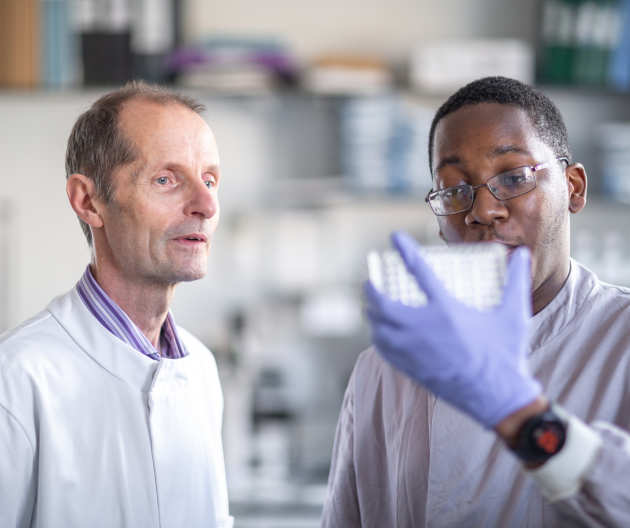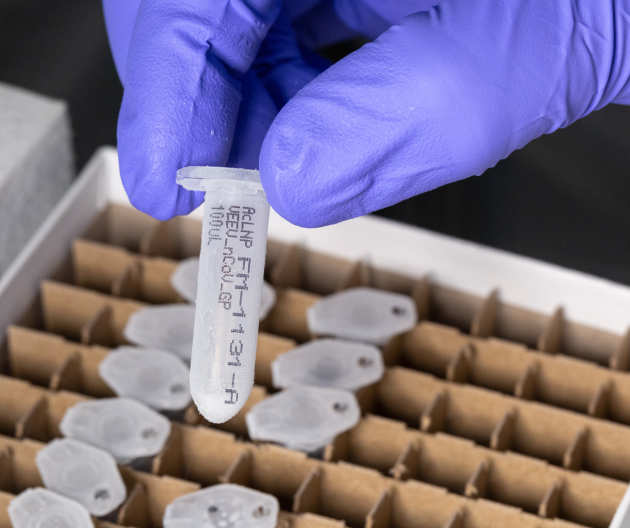 Within just 14 days of getting the genetic sequence from China, Professor Shattock’s team successfully generated a novel coronavirus vaccine candidate in the lab, and their unique approach has the potential to see a vaccine developed, tested and distributed with greater speed and efficiency than ever before. With COVID-19 cases increasing, and life on hold as the world wait for solutions, this work could not be more important.
Within just 14 days of getting the genetic sequence from China, Professor Shattock’s team successfully generated a novel coronavirus vaccine candidate in the lab, and their unique approach has the potential to see a vaccine developed, tested and distributed with greater speed and efficiency than ever before. With COVID-19 cases increasing, and life on hold as the world wait for solutions, this work could not be more important.
The team has already made incredible progress, which has been celebrated in news stories across the country. They have developed a vaccine candidate, progressed to animal trials, and the recently established UK Vaccines Taskforce has committed £22.5 million to support development through a large efficacy trial in the UK starting in October. Never before has the pace of vaccine development been accelerated to such a degree.
However, the scale and urgency of the COVID-19 challenge is unprecedented. Despite the significant achievement of Imperial’s team, further financial support is needed to swiftly and successfully progress their vaccine candidate through efficacy testing in international sites to ensure licensure for global distribution.
Professor Shattock’s team is developing a unique vaccine approach that has significant potential to end the pandemic, in the  UK and globally. This novel vaccine is similar to others being developed by different countries in terms of the displayed antigen – the so-called Spike protein. However, it differs in one crucial aspect: the anticipated human dose is very small, meaning that it will be possible to scale this to millions of doses.
UK and globally. This novel vaccine is similar to others being developed by different countries in terms of the displayed antigen – the so-called Spike protein. However, it differs in one crucial aspect: the anticipated human dose is very small, meaning that it will be possible to scale this to millions of doses.
The approach: a self-amplifying RNA vaccine
The team’s work centres on the development of a self-amplifying RNA vaccine. RNA vaccines are made with strands of genetic material known as messenger DNA, which can be designed to code for any viral bacterial or parasitic protein. They can be quickly customised to protect against emerging pathogens and can be made and deployed faster than conventional vaccines.
 The self-amplifying RNA vaccine works by injecting new genetic code into a muscle, instructing it to make a protein found on the surface of coronavirus, which triggers a protective immune response. Once injected, the saRNA makes multiple copies of itself, meaning that immunity can be induced with very low immunisation doses. While conventional vaccine technology requires reaction vessels and downstream processes able to deal with thousands of litres of material, the saRNA vaccine technology develop at Imperial can enable a million doses to be synthesised in a one litre reaction volume. Initial studies on animals show this amplifying effect to be working and gives us confidence that a self-amplifying RNA vaccine for COVID-19 can indeed be a reality.
The self-amplifying RNA vaccine works by injecting new genetic code into a muscle, instructing it to make a protein found on the surface of coronavirus, which triggers a protective immune response. Once injected, the saRNA makes multiple copies of itself, meaning that immunity can be induced with very low immunisation doses. While conventional vaccine technology requires reaction vessels and downstream processes able to deal with thousands of litres of material, the saRNA vaccine technology develop at Imperial can enable a million doses to be synthesised in a one litre reaction volume. Initial studies on animals show this amplifying effect to be working and gives us confidence that a self-amplifying RNA vaccine for COVID-19 can indeed be a reality.
Ultimately, Imperial’s approach can be scaled to make large quantities of doses worldwide. Enough for the whole UK could be achieved within to months, and through engagement of global manufacturers in low-to-middle income countries, hundreds of millions of doses could be quickly made available to vulnerable populations in these areas.
Imperial is currently seeking to a raise a total of £29 million in philanthropy to enable seamless international testing and ultimately widespread deployment of the vaccine by 2021. Meeting this timeline would break all records. However, with additional dedicated funding, it is achievable.
At this critical moment, when time is of the essence, philanthropic support can have a profound impact. Fast and flexible funding gives an immediate injection of support to innovative and high impact research and development. This funding will allow the team to get on with what matters most – creating the vaccine that the world so desperately needs.
If you are interested in talking more about how we could partner together, please contact Angela Bowen, Director of Development for the Faculty of Medicine and Global programmes on angela.bowen@imperial.ac.uk or on +44 20 7594 1277.
Join the Imperial Today mailing list
Be the first to hear about news, research and updates from across the College.